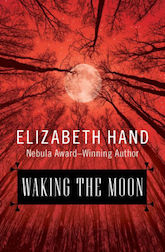So there I was, rummaging through the offerings at my favorite bookstore—the local Goodwill thrift store. Most customers head directly for the quirky used furniture, funky clothes and vinyl albums, but for me, nothing beats the rickety shelves in the back corner that hold the castoff books. I’ve made some major finds there, from classics (Fahrenheit 451) to kitsch (Valley of the Dolls).
My attention was snagged by a battered gray paperback titled Full Spectrum 2. It turned out to be an anthology of science fiction and fantasy tales. I forked over the asking price of a quarter and raced home, whereupon I gobbled up one great story after another, each more delectable than the last.
One story, by a writer totally unknown to me, grabbed me like nothing has grabbed me since my sister jumped out of my closet when I was nine and she was ten, scaring the bejesus out of me, because she took great delight in such torments and had infinite patience when it came to waiting around for the chance to pounce: “The Boy in the Tree” by Elizabeth Hand.
It was creepy and meaningful, it was superbly paced and beautifully written, and it came from an imagination as densely woven and delicately textured—and effortlessly transporting—as the proverbial magic carpet. It was about psychiatric facilities and renegade technologies and reality and non-reality and … okay I’m out of breath now. And that’s not even close to a complete list.
Buy the Book


Waking the Moon
Enraptured by Hand’s fluid and utterly fetching style, and by her ability to make the mundane seem mendacious, I searched for her other books. To my delight, it turns out she’s written a bunch. And that’s how I found Waking the Moon.
Or as I exclusively refer to it now: “OMG—Waking the Moon.”
The novel’s first half is set at a fictional college known as University of the Archangels and St. John the Divine—the Divine for short—a brooding, melancholy campus watched over by mysterious Gothic towers and by professors who favor flowing capes and cryptic pronouncements. If the Hogwarts kids went looking for a college, this is where they’d have their SAT scores sent. I mean: A typical course is called Magic, Witchcraft and Religion—which beats the heck out of boring subjects like trigonometry and botany.
The narrator, Sweeney, soon discovers that the Divine seethes and hums with secrets. There’s no such thing as a pep rally before a Saturday football game here; necromancy is more the thing. And if the summoning of ancient evil forces ends up causing the occasional ritual castration—at least you’re never bored at Divine U.
What most enchants about Hand’s work is her ability to create a world that fairly drips with the sinister—while never losing her grip on a recognizable reality. Everyday things are charged with the uncanny. Ordinary encounters throb with spectral halos. And beauty is never to be trusted.
The major characters in Waking the Moon—earnest, needy Sweeney; gorgeous, self-destructive Oliver; alluring, dangerous Angelica—become so real that you quickly forget they’re just that: characters in a novel. You may find yourself trying to text them when you come across something you’re sure they would find intriguing.
There are some gruesome scenes in the book, to be sure, but tearing down the veil between the known world and the phantasmagoric one that lies just behind it can be a messy business. And besides, Hand’s prose is so mellifluous that you’re easily distracted from the barbarity. You barely notice the demon next door (until it’s too late, of course).
I despise the term “worldbuilding,” because it reduces to dusty, clockwork drabness a literary process that is mist-wreathed and magical and redolent of eerie genius, but that’s what Hand does so magnificently in Waking the Moon: She meticulously constructs a sequence of events that seems familiar—a young woman goes off to college, makes some cool friends, then something terrible happens, and after that she graduates and gets a job and then something even more terrible happens—but it’s like nothing else ever was. Yet.
Know this: After walking through the world of Waking the Moon, you’ll never look at the night sky again without a shudder of apprehension. The wind will sound as if a hidden someone’s moaning in pain. And applying to grad school will be completely out of the question.
 Julia Keller, winner of the Pulitzer Prize and former chief book critic for The Chicago Tribune, is the author of The Dark Intercept, the first volume of a science fiction trilogy set in a future earth where the government monitors your emotions and uses them to control you.
Julia Keller, winner of the Pulitzer Prize and former chief book critic for The Chicago Tribune, is the author of The Dark Intercept, the first volume of a science fiction trilogy set in a future earth where the government monitors your emotions and uses them to control you.










